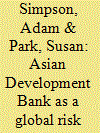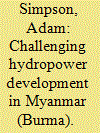|
|
|
Sort Order |
|
|
|
Items / Page
|
|
|
|
|
|
|
| Srl | Item |
| 1 |
ID:
126105


|
|
|
|
|
| Publication |
2013.
|
| Summary/Abstract |
The Asian Development Bank (adb) is engaged in development projects throughout the Greater Mekong Subregion, although for most of the past two decades it has boycotted Myanmar (Burma) because of donor government sanctions. Despite being criticised for its neoliberal focus and its lack of transparency and accountability, the adb's operations compare favourably to those of the Myanmar government and many transnational corporations constructing and financing projects there. This article engages with the concept of risk, which increasingly frames how development in fragile states like Myanmar is understood, to critically analyse the adb's nascent re-engagement in Myanmar according to the risks this poses for five constituencies: the adb itself; donor states; the Myanmar government and military; private capital; and marginalised communities. While deeper engagement in Myanmar poses different risks for each group, critical analysis suggests that the adb must increase the genuine participation of civil society actors in its activities to address the most significant risks of all, those facing marginalised communities.
|
|
|
|
|
|
|
|
|
|
|
|
|
|
|
|
| 2 |
ID:
120209


|
|
|
|
|
| Publication |
2013.
|
| Summary/Abstract |
Although general elections in Myanmar (Burma) in November 2010 have transformed the political landscape, many of the characters remain the same. While there is evidence of incremental domestic political openings many of the political constraints that existed during military rule remain in force. As a consequence of decades of military authoritarian governance and civil conflict, it is Myanmar's contested ethnic borderlands that have been the important locales for the development of environmental movements, despite increased recent domestic activity. This article analyses a case study of the largely cross-border campaign against hydropower dams on the Salween River in Myanmar and finds that through the suppression of opposition and dissent at home the regime has stimulated the creation of an 'activist diaspora', a dynamic transnational community of expatriates who engage in environmental activism beyond the reach of the regime. Due to their relative freedom on the border and in Thailand this community has developed expertise and international networks that have proved crucial in communicating the social and environmental impacts of hydropower development in Myanmar to the international community. Through increased cooperation with an expanding domestic civil society this established activist community is stimulating improved environmental governance of hydropower development and simultaneously assisting in the creation of a more open and democratic Myanmar.
|
|
|
|
|
|
|
|
|
|
|
|
|
|
|
|
| 3 |
ID:
078983


|
|
|
|
|
| Publication |
2007.
|
| Summary/Abstract |
The mantra of energy security is regularly employed as an excuse for governing elites in the less affluent South to pursue large-scale energy projects that are often inappropriate and unnecessary for local development needs. This situation is exemplified in Thailand, Burma and Laos. Here the dominant classes have created an energy 'love triangle', whereby Thailand exports the many problems associated with cross-border energy projects to its more authoritarian neighbours while importing the resultant energy. This article employs critical security literature and the concept of earth rights to investigate these relationships and elucidate resultant linkages between environmental and energy security. It finds that, far from safeguarding local communities from depravation, these projects often exacerbate existing social tensions and conflict, hastening environmental degradation and intensifying various manifestations of insecurity.
|
|
|
|
|
|
|
|
|
|
|
|
|
|
|
|
| 4 |
ID:
175651


|
|
|
|
|
| Summary/Abstract |
There is no obvious end to the ongoing tragedy that faces the Muslim Rohingya communities of western Myanmar. Yet, with two important international legal cases underway at the International Court of Justice and the International Criminal Court there are now important opportunities to maintain pressure on Myanmar’s government. Myanmar’s current government – a fusion of militarist, democratic, ethno-nationalist and conservative interests – has consistently sought to downplay the seriousness of the situation. This attitude, and the fraught, but politically effective, nexus between Aung San Suu Kyi’s National League for Democracy (NLD) and the military, has done much to encourage a culture of impunity among military and civilian decision-makers. Nevertheless, with crucial national elections scheduled for November 2020, and an economy battered by the global COVID-19 shutdown, Myanmar faces a confluence of grave challenges. Under these conditions, key decision-makers in Naypyitaw may hope that international scrutiny of violence against the Rohingya will fade. Given these court actions, however, this is unlikely. Whatever sympathy we may have for Aung San Suu Kyi’s predicament, she will not recover her reputation. And she will forever face hard questions about her inability to prevent, and, more importantly, refusal to condemn, ethnic cleansing.
|
|
|
|
|
|
|
|
|
|
|
|
|
|
|
|
|
|
|
|
|